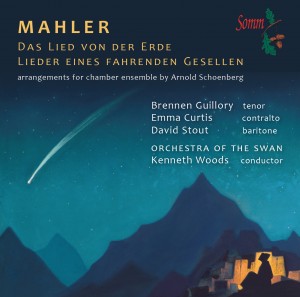There is a review from critic David Patmore in the current issue of Classical Recordings Quarterly of the new Orchestra of the Swan recording of Mahler’s Lieder eines fahrenden Gesellen and Das Lied von der Erde on Somm Recordings. The complete review is available via paid subscription on the Classical Recordings Quarterly website. A short excerpt follows:
Mahler (arr. Schoenberg) Lieder eines fahrenden Gesellen (a); Das Lied von der Erde (b).
bEmma Curtis (con); bBrennen Guillory (ten); aDavid Stout (bar); Orchestra of The Swan / Kenneth Woods.
Somm F C SOMMCD0109 (79mins; DDD); rec. Townsend Hall,Shipton-on-Stour,UK,19/11/10.
This new pairing of chamber reductions of two of Mahler’s finest works for voices and orchestra follows hard on the heels of Somm’s recent release of the Fourth Symphony, also reduced for chamber ensemble (reviewed on page 66). Whereas that disc was directed by David Curtis, this most recent release features the young conductor Kenneth Woods directing the Midlands’s new ensemble, the Orchestra of the Swan, based atStratford-upon-Avon, and appearing frequently in Birmingham. Woods has been making a considerable name for himself as a Mahler interpreter both in the UK and on the west coast ofAmerica, and listening to this new disc it is not hard to hear why. His handling of both works is extremely impressive, with a strong sense of atmosphere and control apparent in each, despite the limitations of the reduced scoring.
In this achievement he is clearly helped by the individual players of the orchestra of the Swan, who yield little to their colleagues in larger orchestras… The Lieder eines fahrenden Gesellen come off best, thanks to some impressive singing from the baritone David Stout, who is well inside the score, both vocally and interpretively…. Emma Curtis gives a most poignant reading of the final Abschied. Somm’s recorded sound, engineered by Gary Cole, is first-rate throughout, with excellent balance and plenty of aural space.
Perhaps the best way to approach this enterprising disc is not as a face-to face encounter directly with Mahler himself, but as an insight into how musicians such as Schoenberg (the driving force in both arrangements), impoverished by the first world war, later sought to experience his music at first-hand. With this adjusted perspective in mind, the new disc is likely to create considerable interest and to give much pleasure.
David Patmore

Recent Comments